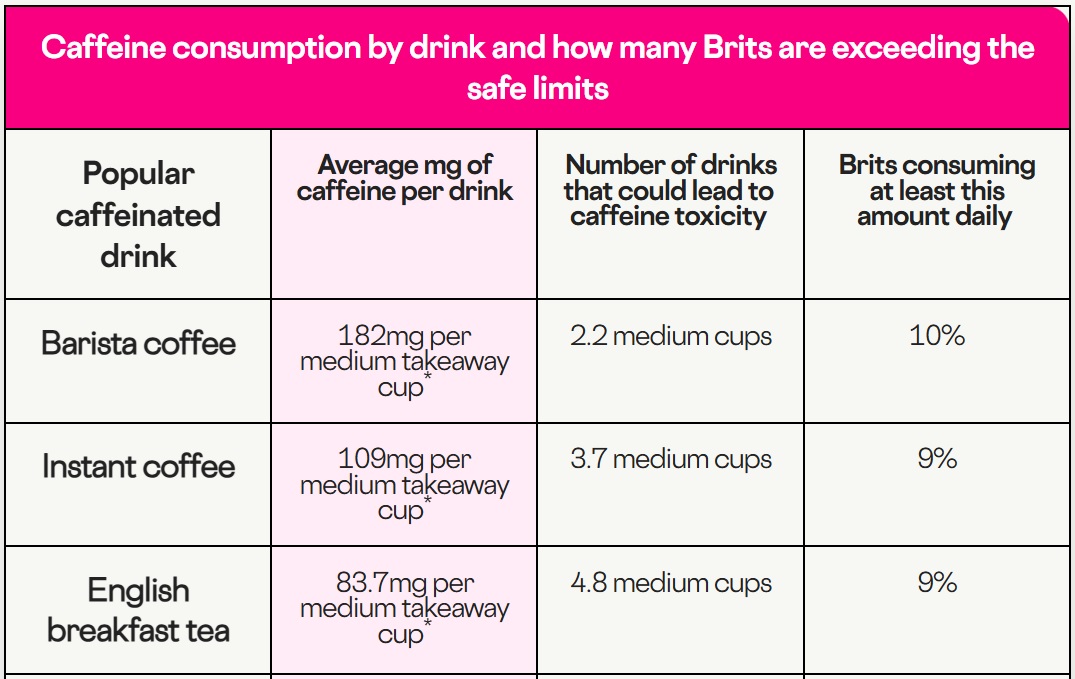
New research from car financing company Carmoola has uncovered the hidden dangers of excessive caffeine consumption on the road – with one in four drivers (25%) admitting it has left them feeling jittery, anxious, or distracted behind the wheel.
Carmoola’s Curbing The Caffeine campaign intends to lift the lid on the UK’s caffeine culture at a time when energy drink sales are surging nationwide – a trend suggesting that more motorists may be turning to high-caffeine options to stay alert on the road.
Around a quarter (22%) of drivers surveyed by Carmoola regularly exceed the recommended daily caffeine limit, putting their focus and alertness on the road at risk.
In partnership with Dr Tim Mercer, GP Partner at TJ & SE Mercer Healthcare Ltd, Carmoola’s research finds that while moderate caffeine intake (up to 300mg) can boost alertness and reaction times.
However, consuming more than 400mg a day – roughly one large cappuccino or two and a half energy drinks – can backfire, causing ‘caffeine toxicity’. This can lead to jitteriness, anxiety, poor concentration, and impaired decision-making.
Dr Mercer, says: “While the NHS advises that 400mg of caffeine per day is a safe upper limit for most healthy adults. Exceeding these levels can lead to restlessness, palpitations and anxiety.
“For motorists, it’s vital to stay calm and in control – too much caffeine can cause the aforementioned jitteriness and even urinary urgency, both of which can be distracting and uncomfortable behind the wheel, where your full attention should be on the road and your surroundings.”
Carmoola’s research also found that one in five people (20%) also regularly choose large or extra-large drink sizes, further increasing their caffeine load before driving.
Despite three in five (58%) motorists reporting they consume caffeine to help them stay alert on the road, a quarter (25%) admit it has made them feel jittery, anxious or distracted – with around one in 10 (8%) saying this happens often.
The research also revealed that one in 20 (5%) drivers – rising to nearly one in 10 (9%) among 25 to 34-year-olds – genuinely believe they “could not drive properly” without caffeine. This number triples in London, where 14% of drivers say they “rely on” caffeine to be able to drive.
Dr Mercer continues: “Caffeine can temporarily mask tiredness, but it doesn’t reverse the effects of sleep deprivation – so while it might make you feel more alert, your reaction times and judgement may still be impaired. If you’re sleep-deprived, the real solution is rest – even a short power nap can make a greater difference than another cup of coffee.”
Awareness of caffeine’s potential impact on driving remains low, with one in three (31%) drivers unaware that excessive caffeine can affect their performance behind the wheel.
As part of the campaign, Carmoola has released an easy-to-read visual guide, inspired by alcohol unit charts, showing the caffeine content of popular drinks – from English breakfast tea to coffee shop favourites and energy drinks – alongside clear thresholds for drivers.
James Gibson, executive director of Road Safety GB, said: “Many drivers rely on caffeine to fight off tiredness, but it’s important to remember that it’s only a temporary boost, not a real solution. Overdoing it on coffee or energy drinks can actually make you feel restless, anxious, or unfocused behind the wheel.
“If fatigue sets in, the safest option is always to stop and rest properly. A quick nap or, better still, a full night’s sleep is the only way to truly restore your concentration and stay safe on the road.”
Comment on this story